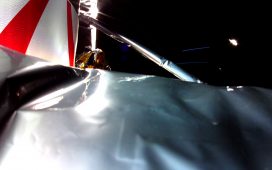NO DOUBLE-DIPPING:
As the US seeks to build alliances to reduce reliance on Chinese technology, it might not tolerate Taiwanese firms seeking to profit from both countries
-
By Wu Su-wei and Jake Chung / Staff reporter, with staff writer
The world might be divided into a China camp and a US-Europe camp following the US ban on Huawei Technologies Co, and Taiwanese firms should be cautious and prepare contingencies, an article published on Friday by a Taiwanese academic said.
Entitled “The tightening of US technology export controls to China and its impact on Taiwan,” the article by Daphne Wang (王綉雯) appeared in the Institute for National Defense and Security Research’s Chinese-language Defense Security Biweekly.
It cited a May 20 report to members of the US Congress that said the US approach to China over the past 40 years has “underestimated the will of the Chinese Communist Party to constrain the scope of economic and political reform in China,” and that the White House has adopted a “competitive approach” toward China “to respond to Beijing’s challenge.”

Photo: Tu Chu-min, Taipei Times
Fearing that it could fall behind China in the development of 5G technology, the US has asked its European allies to shift away from Huawei’s products, and its ban against US companies selling the tech giant’s computer chips is aimed at delaying Chinese 5G development, Wang said.
The US is increasingly aware of the incompatibility of its democratic government and free-market model with China’s military-civil fusion strategy, and the COVID-19 pandemic has generated a consensus to “stop Chinese expansion” throughout the US, she said.
Given these circumstances, Taiwanese businesses are likely to find it difficult to profit from both the US and China, she said.
An announcement by Taiwan Semiconductor Manufacturing Co (TSMC) on May 15 that it would build a factory in Arizona coincided with an announcement that the company was no longer accepting orders from Huawei, Wang added.
Although this could bring short-term benefits to companies such as MediaTek and Hon Hai Precision Industry Co over the medium to long-term, the US would not tolerate Taiwanese companies double-dipping or assisting China in developing its semiconductor industry, she said.
The US ban would affect everything from upstream IC design to downstream package testing and the manufacturing of components and smartphones, all of which are Taiwanese business interests, Wang wrote.
TSMC’s Arizona plant could spearhead an influx of Taiwanese investment in the US, which, along with the existing US supply chain, could form a new industrial ecology, she said.
The US is seeking cooperation from allies to form what it calls the “Economy Prosperity Network” to reduce reliance on China and establish standards across energy, infrastructure, research, trade, education and commerce, she said.
The US is also interested in a UK-proposed alliance of 10 democracies to create an alternative pool of suppliers of 5G equipment, dubbed the “D10,” Wang wrote.
The Chinese government’s response to the D10 is the “China Standard 2035” plan, a set of global standards for emerging technologies, such as 5G Internet, the Internet of Things and artificial intelligence, she added.
Until one side can completely “crush” the other, the world is likely to be divided into the two technology camps, Wang wrote.
Should the US strategy of trying to contain China while delaying its development of 5G technology succeed, it would mean that a China-developed 5G system could only be deployed within China, a possibility for which Taiwanese businesses should prepare contingency plans, she said.
Comments will be moderated. Keep comments relevant to the article. Remarks containing abusive and obscene language, personal attacks of any kind or promotion will be removed and the user banned. Final decision will be at the discretion of the Taipei Times.







